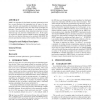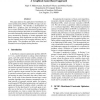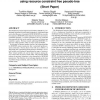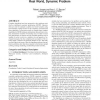111
click to vote
FUIN
2010
14 years 11 months ago
2010
Some distributed constraint optimization algorithms use a linear number of messages in the number of agents, but of exponential size. This is often the main limitation for their pr...
121
click to vote
ATAL
2010
Springer
15 years 3 months ago
2010
Springer
Distributed Constraint Optimization (DCOP) is a popular framework for cooperative multi-agent decision making. DCOP is NPhard, so an important line of work focuses on developing f...
108
click to vote
ATAL
2010
Springer
15 years 3 months ago
2010
Springer
DPOP is an algorithm for distributed constraint optimization which has, as main drawback, the exponential size of some of its messages. Recently, some algorithms for distributed c...
105
click to vote
ISCAPDCS
2004
15 years 3 months ago
2004
This paper addresses the application of distributed constraint optimization problems (DCOPs) to large-scale dynamic environments. We introduce a decomposition of DCOP into a graph...
AAAI
2006
15 years 3 months ago
2006
This paper summarizes the author's recent work in distributed constraint optimization (DCOP). New local algorithms, as well as theoretical results about the types of solution...
131
click to vote
ECAI
2008
Springer
15 years 3 months ago
2008
Springer
We propose a new algorithm for solving Distributed Constraint Optimization Problems (DCOPs). Our algorithm, called DyBop, is based on branch and bound search with dynamic ordering ...
122
click to vote
CSCLP
2008
Springer
15 years 3 months ago
2008
Springer
Abstract. Many agent coordination problems can be modeled as distributed constraint optimization problems (DCOPs). ADOPT is an asynchronous and distributed search algorithm that is...
133
click to vote
ATAL
2008
Springer
15 years 4 months ago
2008
Springer
The Distributed Constraint Optimization Problem (DCOP) is a fundamental formalism for multi-agent cooperation. A dedicated framework called Resource Constrained DCOP (RCDCOP) has ...
105
click to vote
ATAL
2008
Springer
15 years 4 months ago
2008
Springer
This paper discusses the application of distributed constraint optimization to coordination in disaster management situations under sub-optimal network conditions. It presents an ...
145
click to vote
ATAL
2008
Springer
15 years 4 months ago
2008
Springer
Complete algorithms have been proposed to solve problems modelled as distributed constraint optimization (DCOP). However, there are only few attempts to address real world scenari...




